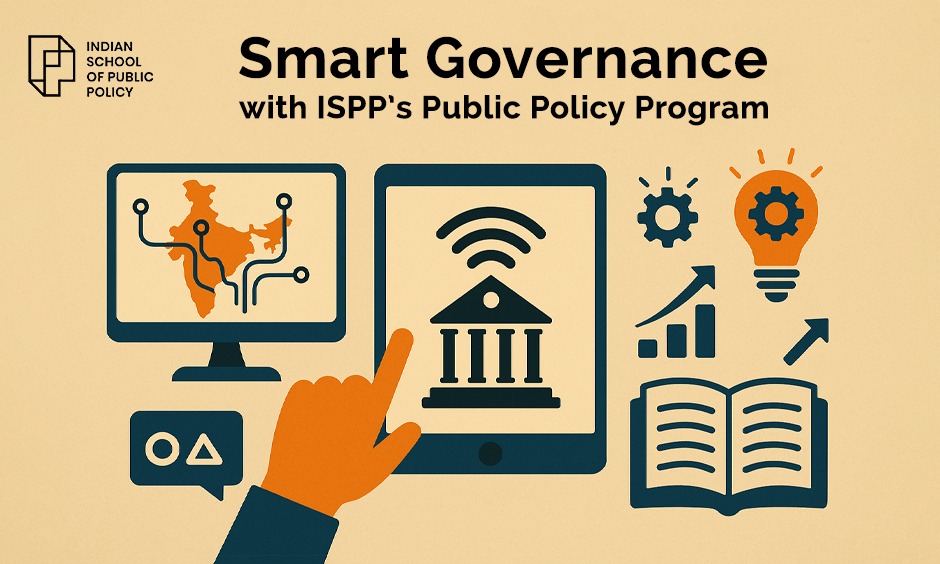Table of Contents
From Circuits to Systems: How ISPP’s Program Shapes Smart Governance

Today’s public landscape is dynamic and complex. And smart governance to manage such a landscape is becoming all about designing resilient, interconnected systems that can adapt and scale. Quick fixes or isolated schemes are no longer workable or viable.
Public leaders thinking or working in silos will not yield any measurable results, it is now becoming all about systemic thinking or holistic thinking. At the Indian School of Public Policy (ISPP), this shift in strategic thinking becomes the very core of how future leaders are trained at the institute.
ISPP’s program is exceptionally built in a unique way to prepare scholars for the age of smart governance, where behavior meets design, strategy meets data, and policy becomes truly people-centric.
Why Systems Thinking Is Critical for Smart Governance
Like many democracies, India is struggling with a gap in governance. Fragmented implementation and planning is at the centre of this issue, despite good intent and hard concentrated efforts of various individuals, programs and organisations. It is unfortunately quote common to see welfare programs duplicating efforts, departments struggling to coordinate, and data flows underutilized. This is where systems thinking becomes necessary.
An integrated approach is critical for smart governance. Whether it be delivering impact in healthcare, education, or digital access, the ability to see interdependencies, feedback loops, and long-term effects separates strong public leadership from reactive administration.
For example, we can compare fragmented food subsidy programs with the Direct Benefit Transfer (DBT) system that simplified and unified delivery. Or how Ayushman Bharat Digital Mission is reimagining healthcare with interoperable data systems rather than standalone records.
ISPP builds this kind of thinking into every element of its curriculum.
How ISPP Teaches Systems Thinking
At ISPP, systems thinking isn’t just a module, it’s a lens applied across subjects and disciplines. Scholars are trained to map root causes, understand policy feedback loops, and explore leverage points for change. Core components include:
- Policy Design Labs to explore complex problems with real-world constraints.
- Mapping whole systems and using tools dedicated to scenario planning are incorporated to evaluate multiple ripple effects of a decision.
- Interdisciplinary learning, combining economics, behavioral science, ethics, and data with governance frameworks.
This multilayered approach helps students not to become strong architects in policy institutions and processes that work towards smart governance at scale.
From Policy Tools to Institutional Design
Rather than viewing governance through the narrow lens of legislation or schemes, ISPP encourages students to think institutionally. What makes a law work? What enables long-term impact? At ISPP, the focus is to ensure that students learn to:
- Diagnose gaps and weaknesses at an institutional level, not just overhead policy gaps.
- Design feedback systems, accountability frameworks, and citizen interfaces.
- Build data-as-infrastructure, not just data-as-reporting.
For example, a recent student project reimagined grievance redressal systems by integrating citizen feedback loops, departmental coordination, and performance-linked dashboards, an approach far beyond traditional complaint management.
Capstone Projects: Where Systems Meet Reality
The program culminates in Capstone Projects where scholars work directly with policy labs, government departments, or mission-driven enterprises. These projects reflect the ISPP philosophy, real-world, applied, and system-aware.
Projects such as partnering with NITI Aayog’s Aspirational Districts Programme to identify systemic bottlenecks in governance outcomes using disaggregated data, and working with a civic startup to improve waste segregation behavior through behavioral nudges help all students in their personal and professional growth.
Faculty and mentors ensure that each and every Capstone project works towards designing of smarter governance systems for long-term transformation, and not just solving for one issue or in a silo.
Learning from System Builders
The ISPP ecosystem is guided by mentors and faculty who have led innovations in the real world—from policy labs and regulatory bodies to civil society and consulting firms. Scholars engage with:
- Former IAS officers who’ve driven institutional reform.
- Development sector leaders who’ve scaled programs across states.
- Tech-policy experts who are working with cutting edge tools AI and implementing them in various platforms and governance frameworks.
These interactions bring grounded perspectives to classroom theory and deepen the scholar’s ability to think, and act in a systemic fashion.
The ISPP Edge: Shaping Public Leaders for Smart Governance
What emerges from this model is a policy expert student who is also a smart governance architect. With skills like the ability to move fluidly between government, think tanks, or public-facing enterprises, translate regulatory design into operational change and lead with systems intuition and execution skill.
And the results of this wholistic curriculum are that ISPP alumni can be seen working in government innovation units, ESG teams in corporates, grassroots consultancies, and impact-driven startups, bringing in a rare blend of empathy, evidence, and enterprise in all their work and projects.
India’s public sector is entering a pivotal era, shaped by digital transitions, climate urgencies, and rising citizen expectations. Smart governance will depend not on the volume of policies, but the quality of systems behind them.
ISPP’s unique pedagogy, interdisciplinary curriculum, and field-based learning make it a trailblazer in this space. For those who believe that public policy should be more than paperwork—and who want to build governance that lasts—ISPP offers both the mindset and the tools to lead the change.




